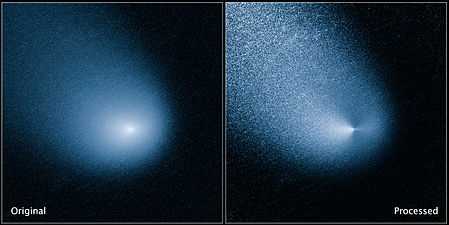2014 AF5
| Discovery[1] | |
|---|---|
| Discovered by | Catalina Sky Survey (703) |
| Discovery date | 2 January 2014 |
| Designations | |
| MPC designation | 2014 AF5 |
| Apollo NEO[2] | |
| Orbital characteristics[2] | |
|
Epoch 2013-Nov-04 (Uncertainty=7)[2] | |
| Aphelion | 2.310 AU (Q) |
| Perihelion | 0.7506 AU (q) |
| 1.530 AU (a) | |
| Eccentricity | 0.5095 |
| 1.89 yr | |
| 354.1° (M) | |
| Inclination | 7.356° |
| 100.7° | |
| 287.6° | |
| Physical characteristics | |
| Dimensions |
~7 meters (23 ft) 5–10 meters |
| Mass | 5×105 kg (assumed) |
| 28.8[2] | |
|
| |
2014 AF5 (also written 2014 AF5) is a near-Earth asteroid roughly 5–10 meters in diameter that passed less than 1 lunar distance from Earth on 1 January 2014.[3]
From mid November 2013 until 1 January 2014 15:00 UT the small dim asteroid had an elongation less than 45 degrees from the Sun with an undetectable apparent magnitude of around 30.[4] While less than 18 degrees from the Sun any dim asteroid can be lost in astronomical twilight. On 1 January 2014 10:00 UT the asteroid passed 0.00062 AU (93,000 km; 58,000 mi) from the Moon and at 16:13 UT passed 0.00064 AU (96,000 km; 59,000 mi) from Earth.[3] The asteroid was then discovered on 2 January 2014 by the Catalina Sky Survey at an apparent magnitude of 18.9 using a 0.68-meter (27 in) Schmidt–Cassegrain telescope.[1] By 3 January 2014 the asteroid was becoming dimmer than apparent magnitude 20.[4]
References
- ↑ 1.0 1.1 "MPEC 2014-A19 : 2014 AF5". IAU Minor Planet Center. 2014-01-04. Archived from the original on 2014-02-01. Retrieved 2014-01-25. (K14A05F)
- ↑ 2.0 2.1 2.2 2.3 "JPL Small-Body Database Browser: (2014 AF5)" (last observation: 2012-10-09; arc: 1 day). Jet Propulsion Laboratory. Retrieved 2014-01-25.
- ↑ 3.0 3.1 "JPL Close-Approach Data: (2014 AF5)" (last observation: 2012-10-09; arc: 1 day). Retrieved 2014-01-25.
- ↑ 4.0 4.1 "2014AF5 Ephemerides for 15 November 2013 through 10 January 2014". NEODyS (Near Earth Objects – Dynamic Site). Archived from the original on 2014-02-03. Retrieved 2014-01-25.
External links
- Orbital simulation from JPL (Java) / Ephemeris
| |||||||||||||||||||||||||||||||||||||||||


